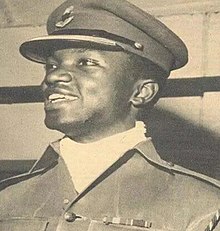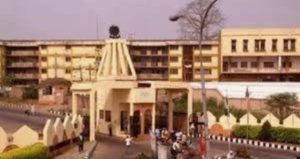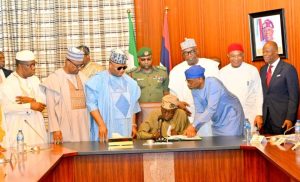
:
LAGOS(Federal Capital).
On the night of January 14-15, a big party was thrown in the Lagos, home of Brigadier Maimalari, the North’s senior army officer.
Soon after it broke up, truckloads of soldiers from Abeokuta barracks, between Lagos and Ibadan in the Western Region, moved into Lagos. A detachment led by Major Emmanuel Ifeajuna arrested the Federal Prime Minister in his house. Balewa left quietly after saying his prayers. The same group also took away Chief Festus Okotie Eboh, the wealthy and influential Minister of Finance, from his house next door. Chief Festus was reported to have struggled violently and to have been beaten.
The power station, telephone exchange, cable,e, and broadcasting station were put under guard. The three most senior Northern officers, Brig. Maimalari, Lt . Col.Pam (Adjutant-General), and Lt.Col.Largema (Commander Fourth Battalion) were shot dead; Maimalari and Pam in their homes, L argema at the Ikoyi Hotel where he was staying.
Pam, a dashing commander in both the Congo and Tiv operations and Maimalari had been popular officers throughout the army. There was also an Igbo casualty that night. Arthur Unegbe.He was in charge of the ammunition store at Ikeja barracks and had refused to hand over the keys when asked for them. He, too, was shot dead…
Aguiyi Ironsi also seemed to have intended to die that night. He was at the Maimalari party and later went to another party aboard the Elder Dempster mailboat Aurcol at Apapa. When he reached home his telephone was ringing. It was Lt.Col.Pam who warned him that something was happening only minutes before Pam himself was shot. I once acted quickly. He drove out of Lagos to the Ikeja garrison. On the way, his Landrover was stopped at a rebel checkpoint, but he mustered enough personal authority (“get out of my way”) to get through. At Ikeja, Ironsi who had risen through the ranks, made straight for the regimental sergeant-major’s quarters and rallied the garrison. The coup had been foiled, and the leaders, Major D. Okafor, head of the Federal Guards, and Major Ifeajuna, fled from the town. According to another version, they left for Enugu to effect the coup there, having inadvertently failed to leave reliable officers in charge in Lagos. The bodies of the Prime Minister and Finance Minister were found a week later in bushes beside the Lagos-Abeaokuta road.
IBADAN (Western Region).
At the heavily guarded Premier’s Lodge, the soldiers met only token resistance from the police, but inside, they met a hail of automatic rifle fire from Samuel Akintola himself. In a twenty-five-minute exchange, the Premier killed several soldiers before finally being taken to their car… Akintola was already badly wounded and he was finished off before his body was bundled into the car…
KADUNA (Northern Region).
In Kaduna, Major C.K.Nzeogwu, the brilliant young chief instructor at the Nigerian Defence Academy, left the Academy early that evening with a detachment of soldiers, mostly Hausa, on “routine exercise”.Nzeogwu was an Igbo, from the Mid-West, but he had lived most of his life in the North and spoke better Hausa than Igbo. When his troops were well outside the town, he told them of the real assignment.”They were armed, and I was not”, he explained later. “They could have shot me if they wished”.At the Premier’s Lodge, three security guards were shot dead, and one of the attacking soldiers was killed before the group could enter the grounds. The house was shelled with mortar fire and to get inside, Nzeogwu blew the door open with a grenade, injuring his hand. The Sardauna, Alhaji Ahmadu Bello, was shot dead, together with one of his wives and two house servants.
Meanwhile, another group had entered the house of Brigadier Ademulegun, the Yoruba commander of the First Brigade, and shot him and his wife in bed. Col Shodeinde, second-in-command at the Defence Academy, also a Yoruba, was shot too; his wife escaped by feigning death by his side.
The North was the only region where the coup went off as planned. On the afternoon of January,15,1966, Nzeogwu broadcast a proclamation” In the name of the Supreme Council of the Revolution,” declaring martial law over an area designated for the first time as the” Northern Province of Nigeria.” Nzeogwu announced that the constitution was suspended, the regional government and assembly were dissolved, and departments were to be run by their permanent secretaries for the time being. In ten proclamations, the death penalty was prescribed for looting, arson, homosexuality and rape, embezzlement, bribery or corruption, obstructing the revolution, sabotage, subversion, false alarm, and assistance to foreign invaders. Nzeogwu went on: “Our enemies are the political profiteers, swindlers, the men in high and low places that seek bribes and demand ten percent, those that seek to keep the country permanently divided so that they can remain in office as Ministers and VIPS of waste, the tribalists, the nepotists, those that make the country look big for nothing before International circles”.He ended “thank you very much and good-bye for now”.
ENUGU (Eastern Region).
In Enugu, the revolt was short-lived. Soldiers surrounded the Premier’s Lodge at about 2:00 am. They invested in the radio station and the Governor’s Lodge, where Archbishop Makarios of Cyprus was staying the night on the last leg of a tour of the Federation.
Early listeners to Radio Enugu heard the voice of a studio engineer at 6:30 am;” This is Effiong Etu. The army is here with us in the studio, and they have ordered us to tune in to NBC Lagos”.At 10:00 am, the Premier, Michael Okpara, and the Governor, Sir Francis Ibiam, were allowed to drive in procession to the airport with the Archbishop and see him off. Soldiers formed a discreet part of the procession. However, Okpara and the other politicians were later allowed to leave Enugu for their home-towns and villages.
At 2pm, on orders from Lagos, soldiers returned to the barracks. The failure of the coup in Lagos had scotched the one in Enugu. Whether the presence of Archbishop Makarios had saved Okpara’s life or whether Igbo soldiers had, after all, found it impossible to kill their tribesman is not yet clear.
Benin (Midwestern Region).
In the Mid-West capital, Benin, nothing happened until 10:00 am on January, 15,1966. Troops arrived in a detachment from Enugu and surrounded the Premier’s and Governor’s houses.
They were withdrawn on the orders from Lagos at 2pm.
LAGOS (January 15th)
At mid-day, a statement broadcast from Lagos said that certain sections of the army had revolted and kidnapped the Prime Minister and Finance Minister but that the” vast majority” of the army remained loyal and that Gen.Aguiyi Ironsi was bringing the situation under control. The General spent the morning at police headquarters trying to live up to this promise. As he emerged, a journalist asked him how things were going.” Very badly, indeed”, he replied.
The army was in a critical condition.
A column of troops under Nzeogwu was driving Southwards from Kaduna, apparently intending to join other rebel forces in a march on Lagos. They reached Jebba, on the Niger River. Had they crossed, nothing could have stopped them from reaching Ibadan, when troops were already defensively dug in on the Northern approaches.
Nigeria seemed close to civil war…
Major Nzeogwu did not hold out. A safe-conduct agreement was reached, and he returned to Lagos. However, he and the other coup leaders were detained. Ifeajuna had fled, first to Enugu and then to Ghana, but he was persuaded to come back and also was detained when Ironsi took over the government as Head of State.


